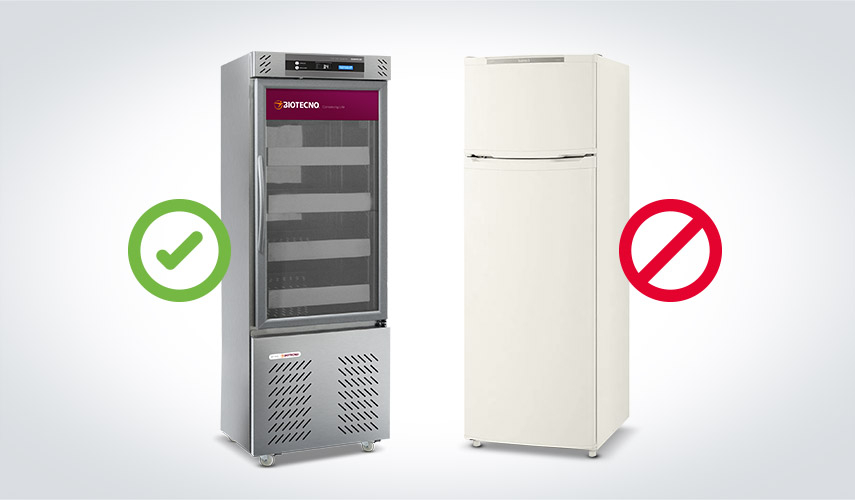


Vaccination is a hot topic among the entire population and, based on this agenda, the conservation of immunization agents is also a topic that is beginning to spread.
As some of the new vaccines require storage conditions different from those of the Brazilian Cold Chain, such as Pfizer/Comirnaty, some adaptations were necessary for conservation in the ultrafreezing and freezing phases. For application in the vaccination room, these vaccines are thawed and brought to a temperature between 2°C and 8°C, a condition in which they can remain for up to 30 days. It so happens that many news about the conservation of these and other vaccines inform that they “can be kept in domestic refrigerators”, to refer to the temperature range – which is a technical error. The terms "common refrigerator" or "domestic refrigerator" should never be associated with the conservation of vaccines, as this practice is prohibited by RDC 197/2017. The correct storage of vaccines must be done in scientific chambers, regulated by the Brazilian Ministry of Health/ANVISA.
Why is it wrong?
The domestic refrigerator poses a constant risk when storing vaccines. Its instability and possible temperature deviations cause the doses to lose effectiveness. Domestic refrigerators do not have energy backup, which causes the temperature inside to rise when there is a drop in the commercial network. Domestic refrigerators also have other technological deficiencies, such as the lack of homogeneity, monitoring and temperature control. As the legislation regarding the transport and storage of vaccines governs, equipment for this purpose must, necessarily, have a temperature monitoring and recording system, to ensure that there has been no failure in the Cold Chain. Therefore, RDC 197/2017 prohibits the use of domestic refrigerators to store vaccines. Every vaccination service must use scientific chambers regulated by the Ministry of Health/ANVISA.
Correct storage in scientific smart refrigeratos for vaccines
Scientific smart refrigeratos for vaccines are equipment with technologies that ensure conservation in all aspects. One part of the technology guarantees a temperature range between 2°C and 8°C, while the other is designed to alert and circumvent any problems, in addition to keeping the chamber cooling down in case of power failure. The smart scientific refrigerators have high connectivity, issue alerts via cell phone, make phone calls automatically in cases of risk and can be accessed remotely for status conference and performance reports. With this connectivity, scientific refrigerators can receive remote access support, directly from the manufacturer, which keeps the registration of each camera valid with the Ministry of Health/ANVISA.
Cold Chain
Roberto Olivares, Commercial Director of Biotecno, the company that manufactured the scientific chamber that stored the first dose of vaccine against Covid-19 applied in Brazil, points out that Brazil, through the PNI, has the best vaccination program in the world, with rules and established standards. The Cold Chain is a process that must be maintained from manufacturing to application. The laboratory, storage centers, vaccine rooms and all other participants in this network must carry out storage and transport correctly, so that vaccines are never exposed to temperatures outside the established range. In summary, the cold chain is the logistical process, for the conservation of immunobiologicals, from the producing laboratory to the end user.
“Vaccines exposed to temperature variations can be inactivated, and some change their appearance and alter their physicochemical characteristics. For this reason, it is very important that health professionals who work with immunizations know the characteristics of the vaccines they administer, are familiar with the conservation norms and with the scientific smart refrigerators necessary for this”, explains Roberto Olivares.